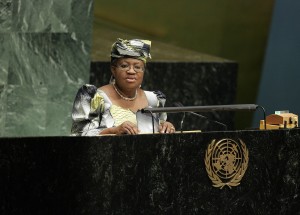
Villagers returning home as the sun sets in the Philippines. Credit: UN Photo
Any contemporary story on development in Asia-Pacific begins with reflection on massive gains achieved in the fight against poverty. The incidence of people living at less than 1.25 dollars a day fell from 54.5 percent in 1990 to 20.7 percent in 2010, with the number of extreme poor declining from 1.48 billion to 733 million. This precipitous decline in poverty has been accompanied by tremendous gains in access to health and education.
Without diminishing the progress made over the last 25 years, the region remains somewhat of a paradox: enviable growth and wealth on one hand and dire poverty and inequality on the other. Asia-Pacific remains home to more than 60 percent of the world’s extreme poor and two-thirds of the world’s hungry. While we’ve seen progress on the Millennium Development Goals (MDGs), it is uneven across and within countries. Despite eye-popping gross domestic product growth, increasing income inequality and vulnerability, infrastructure constraints, climate change and disaster risks threaten to undermine achievements.
As these threats increase, the region’s sources of finance and aid architecture are also rapidly changing. High rates of growth and challenging budget environments in many member-countries of the Organisation for Economic Co-operation and Development (OECD) have resulted in a decline of concessional development finance across Asia. This is against a backdrop of non-aid resources – such as remittances and foreign direct investment – increasing in importance and a growth in funding from “non-traditional” donors, including emerging economies and philanthropic organisations. On top of this, more countries have greater access to international capital markets to fund their development needs.
International efforts to make aid more effective — with conferences held from Rome (2003) to Paris (2005) and Accra (2008) — focused on good principles for aid providers and recipients, largely in the context of attaining the MDGs at the country level. It was less clear how these narrow principles would remain relevant in a rapidly changing global environment, particularly here in Asia-Pacific.
The Global Partnership for Effective Development Co-operation, launched at the fourth High Level Forum on Aid Effectiveness in Busan, recognised this and highlighted partnerships based on shared principles for better development results, nudging forward the agenda on MDG 8 (Develop a Global Partnership for Development). This was advanced further by the United Nations High Level Panel on the Post-2015 Development Agenda which called for a new global partnership framework – a transformative shift for co-operation and mutual accountability. In Bali, March 2013, the Panel agreed on the central importance of a global partnership for a “people-centred and planet-sensitive agenda”, based on “common humanity”.
These developments demonstrate an emerging view that any post-2015 framework needs to be supported by dynamic partnerships. If stakeholders ultimately agree, then the successor to Goal 8 will be central to all other post-2015 goals and applicable to all countries – unlike the MDG framework where goals 1-7 applied to developing countries and goal 8 primarily targeted developed countries.
Asia-Pacific has undertaken serious effort to examine emerging development challenges and goals from a regional perspective, even as the globally agreed post-2015 agenda is being finalised. The eighth Asia-Pacific Regional MDG Report 2012/2013 calls for integrating the three pillars of sustainable development – economic prosperity, social equity, and environmental responsibility into a post-2015 development framework.
By 2015, the ninth report will consolidate ideas from the region on development partnerships and offer insights to strengthen the successor to Goal 8. Three strategic areas for regional and global partnerships have been identified, which help articulate the region’s priorities for a successor to MDG 8. These include:
- regional public goods - e.g. promoting technology and knowledge transfer in the areas of food security, environment and health, which will not only help address development deficits in individual countries, but also have cross-border implications;
- data - strengthening the evidence base for planning and monitoring, including more disaggregation to measure and address inequalities and tracking energy-intensity of GDP rather than just (already low) per capita emissions; and
- finance ̶ expanding financing options for the Post-2015 agenda from both public and private sources.
Countries must each find ways to link the post-2015 and Global Partnership agendas – bringing together distinct goals to reflect nations’ different but complementary responsibilities for a shared global agenda. Collectively, we need to co-ordinate these interlinked agendas – including MDG 8 discussions and the Global Partnership – as well as identify ways to measure results from these partnerships and indicators attached to the successor to MDG 8.
Responding to the region’s aspirations, the Asian Development Bank stands ready to support this process any way we can.
Stephen P. Groff is the Asian Development Bank’s Vice-President for East Asia, Southeast Asia and the Pacific.
]]>The time is right for concerted international action on domestic resource mobilisation in the developing world. Recent high [...]]]>
The time is right for concerted international action on domestic resource mobilisation in the developing world. Recent high performance on collecting taxes and other domestic resources in developing countries shows that if properly harnessed and managed, domestic revenue can be a very important and sustainable source of long-term finance for economic development and reducing poverty.

Foreign Minister Ngozi Okonjo-Iweala of Nigeria Addresses the UN General Assembly. Credit: UN Photo/Devra Berkowitz
Increasing income from domestic resources makes countries less dependent on aid, which can be highly unpredictable. Recently, aid volatility has been exacerbated by frequent fiscal challenges faced by many donor countries. More domestic financial flows would also make low and middle income countries less exposed to donor conditionality, allowing them to choose their own development priorities to meet their citizens’ needs. What’s more, mobilising domestic resources demands good governance and prudent resource management in order to meet taxpayers’ aspirations. In other words, if governments want people to appreciate the need to pay taxes, they must use the extra revenue on high-impact and result-oriented interventions to significantly reduce poverty, inequality, and unemployment and meet other social needs.
According to a recent African Development Bank report, tax revenue collection has improved in many African countries since the 1990s. Overall tax receipts in Africa increased from about 22 percent of GDP in 1990, to about 27 percent of GDP in 2007. However there was some variation across countries.
Tax revenue in low-income African countries was still below 15 percent of GDP – the conventional IMF threshold for satisfactory tax performance, and a level deemed by the United Nations to be insufficient to achieving the Millennium Development Goals.
Some problems in developing countries are illicit financial outflows, mostly due to looting by corrupt leaders and government officials, tax base erosion and profit shifting by multinationals, multiple tax incentives, informal activities not being included in the revenue base, and illicit domestic flows.
Embezzlement of public funds by corrupt officials has become disturbingly pervasive, especially in mineral resource-rich countries in Africa. Also, over-dependence on aid or on abnormal profits from natural resources can make governments oblivious to their potential to raise revenue from other sources. All involved in the Global Partnership for Development should coordinate their efforts to resolve these problems.
Effective development co-operation can boost countries’ own revenue-raising efforts by scaling up donor assistance, as well as sharing knowledge and expertise. It can help develop existing country revenue collection institutions, support reforms and improve accountability mechanisms. It should also help to track progress on institutional and capacity developments using country frameworks.
More expertise is needed for tax officials in developing countries conducting tax policy analyses and designing tax policies appropriate to local country conditions. Investing development aid in building tax systems can yield impressive returns, but only limited funds have been targeted toward this sector so far.
With donor support, developing countries’ governments can invest more in building their own technical capacities, in researching international best practices and in improving their negotiation skills to help them receive maximum benefit from new natural resource contracts. Above all, development frameworks for increasing domestic resource mobilisation should be home-driven and tailored to each country’s specific needs and circumstances, in line with the Busan Partnership Agreement’s first principle of country ownership.
Domestic resource mobilisation is one of the Global Partnership for Effective Development Co-operation’s top priorities for action at its first High-level meeting, to be held in Mexico City in April 2014. As we prepare, I call on all Global Partnership stakeholders including development co-operation providers and recipients, civil society, parliamentarians, and private businesses, to reflect on these issues. With their input, we can have fruitful dialogue to determine how the challenges of domestic resource mobilisation can be properly integrated to the post-2015 development agenda.
It is also imperative that the meeting addresses development co-operation providers’ accountability for timely delivery on their commitments to support these efforts. I believe strongly that the Mexico meeting can better position development co-operation to address the challenges of domestic resource mobilisation in low and middle income countries.
This article was originally featured on the Effective Development Co-operation Blog hosted by the Global Partnership for Effective Development Co-operation to foster constructive comment to help nations, business and organisations work better together to end poverty.
]]>